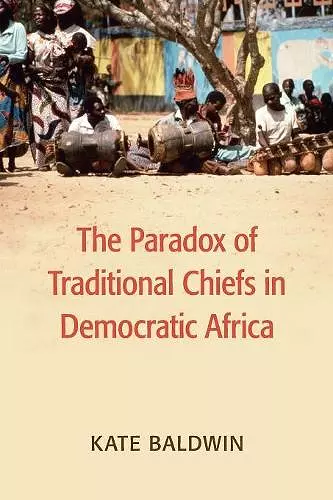The Paradox of Traditional Chiefs in Democratic Africa
Format:Paperback
Publisher:Cambridge University Press
Published:12th Nov '15
Currently unavailable, and unfortunately no date known when it will be back
This paperback is available in another edition too:
- Hardback£92.99(9781107127333)

This book shows that powerful hereditary chiefs do not undermine democracy in Africa but, on some level, facilitate it.
This book is relevant to readers interested in the persistence of traditional institutions in the contemporary world, the possibility for democratic transitions in weak states, the calculus of voters in new democracies, and community-level development in poor countries.The Paradox of Traditional Chiefs in Democratic Africa shows that unelected traditional leaders can facilitate democratic responsiveness. Ironically, chiefs' undemocratic character gives them a capacity to organize responses to rural problems that elected politicians and state institutions lack. Specifically, chiefs' longer time horizons encourage investment in local institutions that enable the provision of local public goods. This is the paradox of traditional chiefs in democratic Africa: elected politicians can only effectively respond to rural constituents through institutions constructed and maintained by local leaders who are not worried about electoral terms. Furthermore, the critical role played by chiefs in brokering local development projects forces us to reassess how we understand the basis of their political influence during elections. The book examines the effects of traditional leaders on the electoral connection in Africa through a multi-method approach that combines qualitative research, surveys, and experiments, with particular attention to the Zambian case.
'The role of the chiefs in Africa has long been hotly contested by politicians and scholars alike. In this superb study, Kate Baldwin re-frames these debates and teaches us much that is new and important.' Robert Bates, Eaton Professor of the Science of Government, Harvard University, Massachusetts
'Are traditional leaders inimical to the functioning of democratic institutions in sub-Saharan Africa? For several decades both scholars of African politics and major African political figures have largely agreed on this basic point. And yet, in this fantastic new book, Kate Baldwin highlights a resurgence of traditional leadership in democratic Africa. She provides plausible theories and a wide -range of evidence to explain their enhanced role and to support the claim that chiefs routinely act as surprisingly effective 'development brokers'. This important work should be of great interest to scholars, students and practitioners in the field of African development.' Evan S. Lieberman, Total Professor of Political Science and Contemporary Africa, Massachusetts Institute of Technology
'Why does African traditional leadership survive in a democratic era? For the simple and surprising reason that chiefs often make democracy work better for citizens. Baldwin''s wide- ranging study challenges us to rethink old models of governance and their view of traditional and modern authorities in opposition to one another. This is a book with very broad implications for Africa and elsewhere.' David Stasavage, New York University
'Democracy is thought to promote local public goods provision. But while democratic electoral institutions may create incentives for politicians to respond to citizens' demands, they do not provide the capacity for politicians to actually deliver the local public goods that citizens crave - and in many rural African settings this capacity is severely lacking. This, as Kate Baldwin shows in this remarkable book, is where traditional chiefs play a critical role. Their embeddedness in the communities they rule, combined with their long time horizons, puts them in a unique and advantageous position to organize local public goods provision in partnership with elected leaders. Traditional chiefs should therefore be seen not as undemocratic vote brokers who pervert the democratic process, but as critical contributors to local accountability and development. For both its novel argument and the impressive evidence marshalled to support it, [this book] makes a major contribution to the study of the political economy of rural Africa.' Daniel N. Posner, James S. Coleman Professor of International Development, University of California, Los Angeles
'Baldwin has rescued African chiefs from oblivion … Highly recommended.' R. I. Rotberg, Choice
ISBN: 9781107566446
Dimensions: 228mm x 152mm x 16mm
Weight: 390g
253 pages